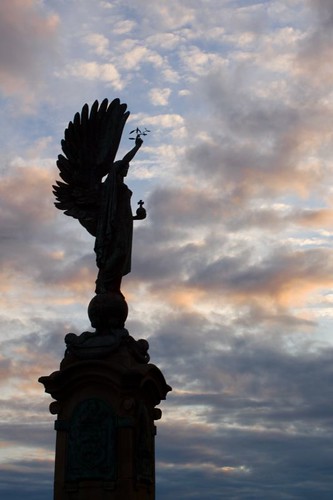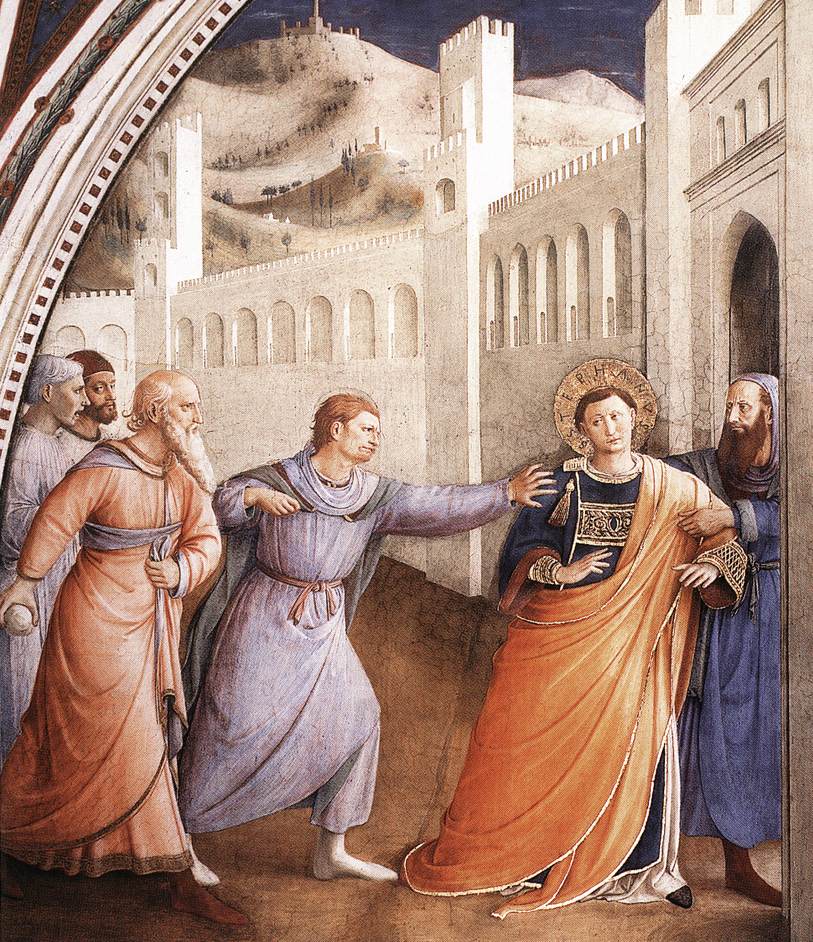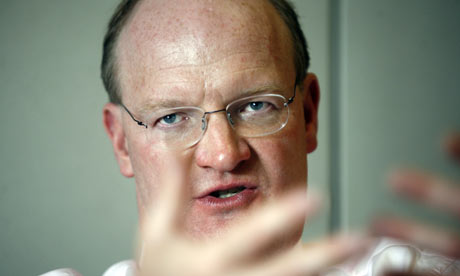
One of the most influential and acclaimed films (let alone Westerns) of all time, John Ford's
The Searchers (1956) is, like
Citizen Kane,
Gone With the Wind and
The Godfather, one of the untouchable Hollywood classics whose appeal and acclaim protects it from criticism and analysis. Despite flaws in story structure and its obnoxious supporting cast, Ford's magnum opus holds up well as a work of cinematic art. Technically it's without peer, and its thematic and moral ambiguities rank it far above most any other Western, American or otherwise. In many ways, the film's flaws enhance its stature: if nothing else, it epitomizes John Ford, for better or worse, with a conflicted, layered and thoughtful view of America's Westward expansion, mixing progressivism and hope with bloodshed and racism.
Ethan Edwards (John Wayne) returns to his brother Aaron (Martin Coy)'s Texas homestead three years after the Civil War. When Ethan joins a posse of Texas Rangers led by the Reverend Captain Clayton (Ward Bond) tracking cattle rustlers, Aaron and his family are slaughtered by a tribe of Comanches led by Chief Scar (Henry Brandon), who take daughters Lucy (Pippa Scott) and Debbie (Natalie Wood) hostage. Accompanied by adoptive "half-breed" nephew Martin (Jeffrey Hunter) and Lucy's fiancee Brad Jorgenson (Harry Carey Jr.), Ethan obsessively tracks Scar across Texas, even as changes in season and climate delay his pursuit. Even though his marriage to Laurie (Vera Miles) is jeopardized by his absence, Marty keeps along with Ethan, increasingly convinced that Ethan's intent is not to rescue his nieces, but to kill them.
The Searchers is usually taken as a mediation on racism, and that's fair on one level. Perhaps more importantly, however, it's a depiction of Manifest Destiny and the American character. The film's sympathies obviously lie with the white settlers, who for all their foibles represent Ford's hopeful progressivism about America's future, but Ethan is depicted as a violent, anti-social loner, outcast from this rough-hewn but friendly community. Ford approaches the subject matter with great care and ambiguity, his poetic subtlety more effective than the obvious, noble posturing in
Sergeant Rutledge and
Cheyenne Autumn. Essentially the question posed by the film is: Is Ethan's violent racism an aberration, or the very core of the American character? Ford seems to hope the former, but on the basis of evidence persented, it seems the latter is more likely.
Ethan Edwards is one of the most fascinating, complex protagonists in Hollywood cinema, representing the dark side of Manifest Destiny. At first glance, he's simply another Fordian "dark horse" like Doc Holiday in
My Darling Clementine or Tom Doniphon in
The Man Who Shot Liberty Valance, a rough hewn frontiersman necessary for the settling of the West. However, Ford and Wayne portray him in a much darker light than those romantic heroes. He's a veteran of the Confederate army, who apparently fought for Maximillian's army in Mexico, and the Reverend Clayton implies engaged in outlaw behavior on the side. He's not only a racist, but a murderer too, shooting wounded Indians in the back, massacring buffalo, and shooting out the eyes of a dead Comanche, dooming him to Purgatory. Given this, it's not at all surprising when he tries to kill Debbie later in the film. Many critics have read further subtleties into the character - his probable affair with his brother's wife (Dorothy Jordan), the possibility that he is Martin or even Debbie's father. Motivated by a twisted combination of racism, revenge, and other assorted neuroses, Ethan is a destructive character; even his redemptive act at the climax leaves him excluded from society, without the acknowledgment or heroic death afforded to most such characters, the door irrevocably shut on him.
The portrayal of Native Americans is strictly from a white point-of-view, from Scar's savages to the passive reservation Cheyenne, but this is hardly a flaw excusive to this film. Whatever their justification, frontier warfare between whites and Indians - especially tribes like the Comanche - was bloody and brutal, with both sides guilty of atrocity, and denying this for reasons of political correctness is badly misguided. Ford takes care to balance the ledger (if imperfectly), with his sympathetic (if broad) portrayal of Martin's Indian bride Look (Beulah Archuletta), a massacre of an Indian village, Indians being force-morched through an icey landscape by cavalry (presaging a key scene in
Cheyenne Autumn). Even the final battle is less-than-heroic, showing Texas Rangers charging, guns blazing, through a camp made up mostly of women, children and old men. If he isn't entirely fair in depicting Indians, Ford at least acknowledges that frontier violence and mayhem weren't one-sided.
Ford is much less successful with his supporting cast, far-too-often stopping the film cold for awkward, obnoxious bits of broad comic relief. The travails of the crack-brained Mose Harper (Hank Worden), the dopey guitar-playing Charley McCory (Ken Curtis) and the bumptious Jorgensons inevitable draw groans and eye-rollings from modern audiences (especially my Film Analysis class). These scenes slow the film to a crawl, particularly the wedding sequence, and except as a very broad depiction of frontier life and the more positive, hopeful side of Western settlement, it's hard to justify their inclusion. The film is Ford at his most schizophrenic: as beautiful as the images as are, as insightful the message and well-drawn the protagonist, we still have to sit through a great deal of bumptious Ford comedy which only weakens the film.
The film is unquestionably a work of art, with directors from David Lean and Sergio Leone to Steven Spielberg and George Lucas finding inspiration from Ford's use of landscape and filming of action scenes. Monument Valley has never been better used, with Ford using the landscape with remarkable results; rarely has there been a more visually striking, beautiful film, with the massive butes and canyons setting a truly epic stage. The quick-edited, exciting action scenes - especially the first skirmish with the Comanche and the final attack on Scar's village - directly inspired the exciting horse charges of
Lawrence of Arabia and have provided inspiration for many more, while the tense build-up to the opening massacre, with fluttering sage hens, barking dogs and menacing bird calls, inspired a key scene in
Once Upon a Time in the West. Most of the violence occurs offscreen, with words, gestures and facial expressions adequate to infer the horror of an Indian massacre or rape. Max Steiner contributes a violent, rousing score perfectly appropriate to the film, heightening the tension and emotion.
John Wayne has never been better than Ethan Edwards. Perhaps delving into his own psyche, Wayne perfectly conveys Ethan's conflicted nature, driven by demons even he can't fully understand. There's no difficulty in channelling his usual persona into this borderline evil character. Wayne uses his familiar voice and figure to make an impression, but also engages in subtle uses of body language and facial gestures: his horrified reaction to seeing his brother's burning homestead is perhaps the finest moment in his career, as is the scene where he disgustedly stares at a group of rescued Cheyenne captives: "They ain't white - anymore!" Anyone who thinks Wayne can't act after seeing this film or
Red River is just plain ignorant.
The supporting cast is more hit-and-miss. Jeffrey Hunter (
Sergeant Rutledge) gives a fine star-making turn as Martin, serving as a perfect foil to Ethan's unspooling madness. The reliable Ward Bond acquits himself well as the Reverend Captain, Olive Carrey brings dignity and grace to her part, and Natalie Wood does well with her brief screen time. Henry Brandon (
Vera Cruz) is an imposing presence as Scar but lacks the screen time to become a truly menacing villain. The rest of Ford's stock company is generally obnoxious, with John Qualen (sporting the same Swedish chef accent as in
Liberty Valance), Vera Miles and Hank Worden being the worst offenders. Ken Curtis at least has the amusing moment where he switches from addle-brained cowpoke to skilled singer, but the others are just a nuisance.
For all its flaws,
The Searchers is a wonderfully rich, textured and fascinating film. It is not a flawless film, nor is it Ford's best, but it remains a masterpiece whose depths and complexities can only be revealed by repeat viewings.


































